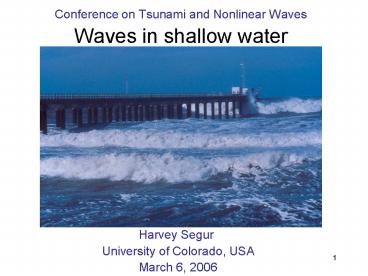Conference on Tsunami and Nonlinear Waves Waves in shallow water
1 / 36
Title: Conference on Tsunami and Nonlinear Waves Waves in shallow water
1
Conference on Tsunami and Nonlinear Waves Waves
in shallow water
- Harvey Segur
- University of Colorado, USA
- March 6, 2006
2
Joe Hammack 1944-2004
3
Equations of water waves
- (i) On bottom, z -h(x,y)
- (ii) In fluid, -h lt z lt ?(x,y,t)
- (iii) At free surface, z ?(x,y,t)
- (iv) Ignore viscosity, surface tension, variable
density, fishes,
4
Basic facts about wave propagation(according to
linear theory)
- Sound waves
- All travel at the same speed (speed of sound)
- Water waves
- Longer waves travel faster than shorter waves
- (for gravity-induced surface water waves)
5
Basic facts about wave propagation(according to
linear theory)
- Sound waves
- All travel at the same speed (speed of sound)
- Water waves
- Longer waves travel faster than shorter waves
- (for gravity-induced surface water waves)
- But all very long waves all travel at speed
- gravity fluid depth
6
Long waves travel faster than short waves
from Stokers Water Waves, 1957
7
What happens to very long waves?
- D.J. Korteweg G. deVries
- (1895) derived their equation
- to describe the motion of
- long waves of moderate
- amplitude.
- Is the KdV equation relevant to the tsunami
of 2004?
8
To derive KdV or KP
- Assume
9
To derive KdV or KP
- Assume
- Long waves (??gtgt h)
- (shallow water)
10
To derive KdV or KP
- Assume
- Long waves (??gtgt h)
- (shallow water)
- Small amplitude (h gtgt a)
11
To derive KdV or KP
- Assume
- Long waves (??gtgt h)
- (shallow water)
- Small amplitude (h gtgt a)
- Motion primarily in one direction
- if exactly so, ? KdV
- if approximately so, ? KP
12
To derive KdV or KP
- Assume
- Long waves (??gtgt h)
- (shallow water)
- Small amplitude (h gtgt a)
- Motion primarily in one direction
- if exactly so, ? KdV
- if approximately so, ? KP
- All small effects are comparable
13
At leading order (with constant h)
- Wave equation in 1-D
- with
- ?
14
At leading order
- Wave equation in 1-D
- with
- ?
- At next order, satisfies either
- KdV
- or
- KP
15
Tsunami of 2004 - approximate scales
- In the Bay of Bengal,
- h 3 km (fluid depth)
- For the tsunami,
- ? 100 km (wavelength)
- a 1 m (wave height)
- L 900 km (lateral extent)
- 620 km/hr (wave speed)
16
Computer animation of 2004 tsunami
Kenji Satake, Japan http//ioc.unesco.oro/itsu/
or, see Steven Ward,
US http//www.es.ucsc.edu/ward/
17
Volume of water in 2004 tsunami(per width of
shoreline)
1 m
100 km
18
Wave speed
- Open ocean
- c 620 km/hr
- A wave 100 km long passes by in about 10 minutes
- Near shore
- Front of wave slows as it approaches the shore
- Back of the wave is still in deep water
- Consequence Wave compresses horizontally and
grows vertically
19
How long waves evolve(in water of uniform depth)
(Hammack Segur, 1978)
20
Experimental data
(Hammack Segur, 1978)
21
Tsunami summary (so far)
- A long water wave of small amplitude, like a
tsunami, travels with approximate speed - The tsunami changes its shape primarily in
shallower coastal waters, where h(x,y) decreses. - A tsunami that is barely noticeable in the open
ocean becomes deadly in coastal waters because - - (locally) and
- - wave volume is conserved.
22
Other waves in shallow water
- Objective
- Find the natural structure(s) of ocean waves,
including those in shallow water
23
Waves caused by winds
- Most ocean surface waves are caused by storms and
winds. - Travel thousands of miles, over several days
- Oscillate, approximately periodically
- Long waves travel faster than short waves
- Two separate theories
- Waves in shallow water (today)
- Waves in deep water (next Friday)
24
Long waves in shallow water(wave length gt water
depth)
- Simplest model
- All waves travel with speed
- For long waves of moderate amplitude, all
traveling in approximately the same direction in
water of uniform depth, a better approximation is
(Kadomtsev-Petviashvili, 1970)
25
Uniform train of plane waves in shallow water
(National Geographic, 1933)
26
Another train of plane waves in shallow
water(Lima, Peru, 2004)
27
Oblique interaction of plane waves in shallow
water
(T. Toedtemeier)
28
Two-phase solution of KP equation
29
Experiments on two-phase waves in shallow water
(Hammack, Scheffner, Segur, 1989) (Hammack,
McCallister, Scheffner, Segur, 1995)
30
Application rip currents
Rip Currents at Rosarita Beach Baja California
Periodic Array of Rip Currents Sand City, CA
31
Experiments on rip currents
(Hammack, Scheffner, Segur, 1991)
32
Thats all, folks
33
A rogue wave
Waves measured at Draupner oil platform in the
North Sea, 1995. Peak wave 18.5 meters,
standard deviation of wave record 3 meters
34
Do two-phase waves exist in the ocean?
35
Tata Research Development and Design Centre Waves
in shallow water
- Harvey Segur
- University of Colorado, USA
- March 22, 2006
36
SANUM Conference Waves in shallow water
- Harvey Segur
- University of Colorado, USA
- April, 2006































